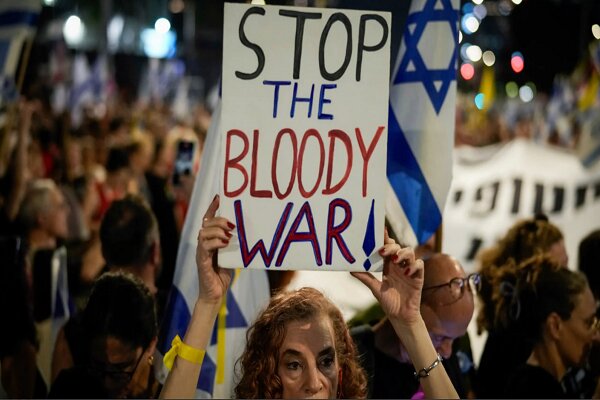The cultural frontline Israeli authors call out the human cost of endless war
The cultural frontline: Israeli authors call out the human cost of endless war
TEHRAN - The recent petition from hundreds of prominent Israeli literary figures demanding an end to the Gaza war represents a rare public display of dissent by Israel’s cultural elite and a gap in Israeli society over the current conflict and its human costs.

This, combined with parallel movements by dissident military reservists, academics, and the international literary community, is part of a rich, complex, and often difficult challenge to the Israeli regime’s war policies, posing far-reaching questions about culture, politics, and ethics in wartime.
A cultural elite breaks ranks
The signers—authors, poets, publishers, illustrators, literary editors, and academics—are blunt. They say Netanyahu has deliberately squashed a step-by-step deal to end the war for fear that peace would be the death of his political career and personal freedom, as legal accusations continue to pile up.
This charge, the charge that the prime minister is prepared to extend a calamitous war so that he will not go to prison, targets the very center of Israel's political crisis and provokes fundamental questions concerning the conjunction of politics, justice, and war.
Among the honored list of signers are Israel Prize recipient Nitza Ben-Dov, playwright Yehoshua Sobol, Sapir Prize winner Ofra Offer Oren, and journalist Daniella London Dekel, bringing significant cultural weight to the petition. Their appeal is to Netanyahu and the defense minister, government officials, Knesset members, and senior IDF officers, representing a broad-based call for accountability and policy reform.
Wider social and military discontent
The appeal of the writers was one of the many diverse forms of expression of dissatisfaction, alongside letters and declarations signed by thousands of military reservists, doctors, and academics who are calling for the end of the war. These groups are warning that the prolongation of the fighting is jeopardizing the lives of the hostages and soldiers, but the politicians are using the conflict to strengthen their power, rather than to establish real security.
The participation of the military in such appeals is especially striking, as such steps weaken the government’s position by those who are supposed to execute its orders. Internal resistance reflects a wider public debate on the cost and price of the conflict. The breakdown of the January 2025 ceasefire and subsequent continuation of Israeli bombardments of Gaza have spawned unprecedented levels of killing and destruction, causing anger and despair among the Israeli people.
Many of them are wondering whether the government’s policy is wise or just. The call from military and academic circles gives more weight to the cultural elite’s demand, implying that resistance is not limited to fringe elements of society but has spread throughout Israeli society.
The timing is strategic. With global criticism against Israel piling up—spearheaded by UN accounts of the Gaza humanitarian crisis—it coincides with worldwide calls for de-escalation, thus multiplying its impact. Its hostage angle appeals to global human interest, making it hard for critics to paint it as naive pacifism.
International literary boycott and cultural warfare
In addition to these domestic voices in Israel, there is also a global, mass-scale collective cultural boycott of Hebrew letters and works in the global literary community, based on the fact that these works were, until recently, part and parcel of Israel and are currently known to be participating in the occupation and aggression against Palestinians.
Over 1,000 writers and literary workers from around the world have signed up to boycott Israeli publishers, literary festivals, and cultural events that do not respect Palestinians' rights. They call it the largest-ever cultural boycott of Israel and officially denounce it as similar to the global anti-apartheid boycotts of South Africa.
The boycott campaign is a war of cultures, with the intent to ostracize Israel internationally and pressure its institutions to change policies that are believed to foster injustice and violence. This is a sign of growing cultural and intellectual protest in the world, as literature and art continue to shape public perception and politics through their works.
The petition by hundreds of Israeli literary figures is a significant moment in the ongoing discussion of the future of the Israeli-Palestinian conflict. This is because it offers a direct challenge to the narratives that govern military activities and calls for a reassessment of the Israeli strategy in Gaza.
Moreover, it demonstrates a tendency that can be observed in Israeli society: more and more people are questioning the moral, ethical, and political costs of the conflict. Although the petition might not lead to the immediate cessation of the war, it serves as a reminder that scholars and cultural figures have a lot to offer in response to the question of violence and militarism. In the long run, it might form the basis of a more sustainable and fair peace.
source: tehrantimes.com